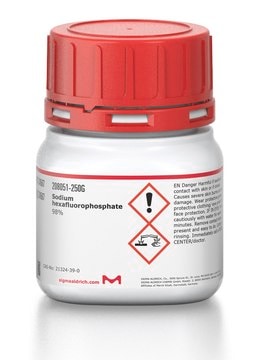936014
Sodium bis(trifluoromethanesulfonyl)imide solution

in ethylene carbonate, dimethylcarbonate, and ethylmethylcarbonate, 1.0 M NaTFSI in EC/DMC/EMC=1:1:1 (v/v/v), battery grade
Synonym(s):
1.0 M NaTFSI in EC/DMC/EMC electrolyte
About This Item
Recommended Products
grade
battery grade
Quality Level
form
solution
greener alternative product characteristics
Design for Energy Efficiency
Learn more about the Principles of Green Chemistry.
sustainability
Greener Alternative Product
concentration
0.95-1.10 M (NaPF6)
impurities
≤100 ppm H2O
application(s)
battery manufacturing
greener alternative category
Looking for similar products? Visit Product Comparison Guide
Related Categories
General description
Application
related product
Signal Word
Danger
Hazard Statements
Precautionary Statements
Hazard Classifications
Acute Tox. 4 Oral - Eye Dam. 1 - Skin Corr. 1B - STOT RE 2 Oral
Target Organs
Kidney
Storage Class Code
8A - Combustible corrosive hazardous materials
WGK
WGK 3
Certificates of Analysis (COA)
Search for Certificates of Analysis (COA) by entering the products Lot/Batch Number. Lot and Batch Numbers can be found on a product’s label following the words ‘Lot’ or ‘Batch’.
Already Own This Product?
Find documentation for the products that you have recently purchased in the Document Library.
Our team of scientists has experience in all areas of research including Life Science, Material Science, Chemical Synthesis, Chromatography, Analytical and many others.
Contact Technical Service









